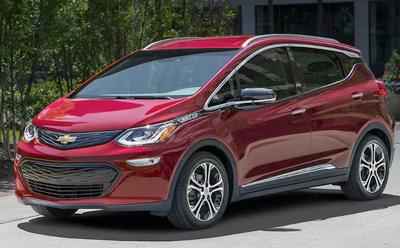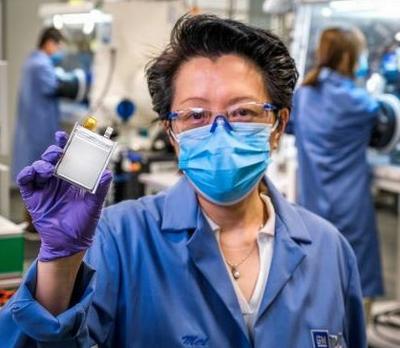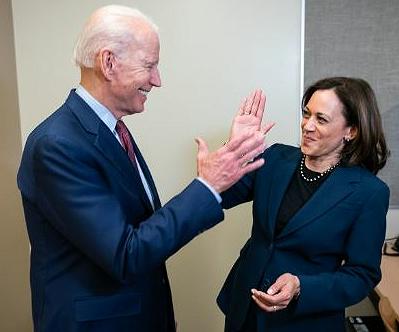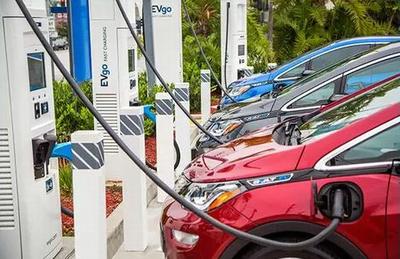
DETROIT, Michigan, November 25, 2020 (ENS) – General Motors CEO Mary Barra said on Monday the company is pulling out of a lawsuit led by the Trump administration against California over the state’s right to set its own fuel economy and emissions regulations, effective immediately. Barra said the company is taking this action because it supports President-elect Joe Biden’s plans to expand electrification of cars.
“Given this shared enthusiasm and the President-elect’s call to bring the country back together, we believe there is now a path to achieve agreement on a national standard and complementary policies to accelerate the electrification of the light-duty transportation sector,” Barra wrote in a letter to environmental groups.

Barra wrote, “We believe the ambitious goals of the President-elect, California and General Motors are aligned to address climate change by drastically reducing automobile emissions,” wrote Barra in the letter. “We are confident that the Biden administration, California and the U.S. auto industry, which supports 10.3 million jobs, can collaboratively find the pathway that will deliver an all-electric future.”
“To better foster the necessary dialogue, we are immediately withdrawing from the preemption litigation and inviting other automakers to join us,” Barra wrote.
President-elect Biden said he was encouraged by the General Motors move. “Today’s announcement that General Motors is committed to working with the Biden-Harris Administration and the broader U.S. auto industry to build a future in which America leads the world in the manufacturing of zero-emissions vehicles is encouraging news for our economy, our planet, and the long-term success of American autoworkers,” Biden said Monday.
“GM’s decision reinforces how shortsighted the Trump Administration’s efforts to erode American ingenuity and America’s defenses against the climate threat truly are. In addition to advancing our ambitious climate goals, this decision will have a positive ripple effect as our nation strives to outcompete our global competitors, create good-paying union jobs here at home, and reclaim our place as leaders in innovation and manufacturing – all of which will be priorities in my administration.”
“Perhaps most importantly,” Biden said, “GM’s choice to work with the Biden-Harris Administration and California to advance these goals demonstrates a promising path forward for how industry, labor, government, and environmental organizations can come together to tackle big problems and make vital progress on behalf of the American people. That cooperation and shared purpose is central to my Build Back Better plan, which I had the opportunity to discuss with GM CEO Mary Barra and United Auto Workers President Rory Gamble last week alongside other top business and labor leaders.”
The White House and the Justice Department each declined to comment. U.S. Environmental Protection Agency, EPA, spokesman James Hewitt made a non-specific remark, “It’s always interesting to see the changing positions of U.S. corporations.”

California has been regulating vehicle emissions since 1959. Its authority to do so has been repeatedly recognized, reaffirmed and expanded by Congress.
The U.S. EPA has granted smog-bound California waivers for its clean air and climate program for decades based on its long-standing determination that California’s standards are at least as protective as federal standards, and are needed to meet compelling and extraordinary conditions of polluted air.
After California obtains a waiver for specified emission standards, the Clean Air Act allows other states that are or have been noncompliant with federal ambient air quality standards to adopt California’s standards as their own. To date, 13 states and the District of Columbia have adopted all or part of California’s regulations under the Clean Air Act.
In October 2019, GM joined Toyota, Fiat Chrysler and other automakers in backing the Trump administration in its bid to bar California from setting its own fuel-efficiency rules or zero-emission requirements for vehicles.
California and 22 other states and the cities of Los Angeles and New York challenged the Trump administration’s determination that federal law bars California from setting strong tailpipe emission standards and zero-emission vehicle mandates.
This past summer, the California Air Resources Board, CARB, announced that Ford, Honda, Volkswagen, Volvo and BMW had voluntarily agreed to uphold the state’s clean air goals whether the courts side with the Trump administration or not. For their cooperation, CARB will give these companies credits for producing electric vehicles and more time to meet the regulations for reducing tailpipe emissions.

As for General Motors, the company is embarking on an extensive plan to manufacture at least 30 models of electric vehicles in the next five years.
Barra revealed November 19 that the company will offer 30 all-electric models globally by mid-decade. Forty percent of the company’s U.S. entries will be battery-electric vehicles by the end of 2025.
Barra also announced an increase in GM’s financial commitment to electric and self-driving vehicles to $27 billion through 2025 – up from the $20 billion planned before the onset of the COVID-19 pandemic early this year.
“Climate change is real, and we want to be part of the solution by putting everyone in an electric vehicle,” said Barra. “We are transitioning to an all-electric portfolio from a position of strength and we’re focused on growth. We can accelerate our EV plans because we are rapidly building a competitive advantage in batteries, software, vehicle integration, manufacturing and customer experience.”
Engineering advances have increased the previously stated GM-estimated maximum range of Ultium battery-based vehicles from 400 miles on a charge. GM’s Ultium-based electric vehicles, when produced, will be capable of driving ranges up to 450 miles on a full charge.
By 2025, Barra said GM plans to launch 30 EVs around the world, and more than two-thirds will be available in North America. Cadillac, GMC, Chevrolet and Buick will all be represented, with EVs at all price points for work, adventure, performance and family use.
Copyright Environment News Service (ENS) 2020. All rights reserved.



